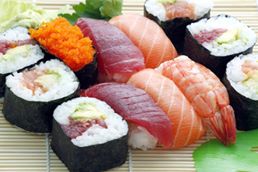Salmon – is there something fishy going on?

Food should always be as healthy as can be, true?
Now some of us make more thoughtful choices than others when it comes to choosing the most healthy food. Some of us eat fish, some of us don’t.
But when you do decide to eat fish, wouldn’t you like to know whether the salmon you are eating is the most healthy one? Knowing the answers is going to determine whether you, as a conscious consumer, can make the right choices in living a healthy life. Time to ask yourself the following questions.
Do I know whether the fish eggs were produced in a healthy way? Do I know where this fish was cultivated? Do I know what kind of medicine it was give! Do I know what kind of food it ate, and do I know if that food was healthy? Are there any toxic preservatives I need to know about? Can I relay on the reassuring answers given by scientists? Did the salmon have enough space to develop in a safe and sustainable way? Do I know if the water it has lived in was as clean as it could be? Was this fish given medicine, needed or to prevent diseases? What were the working conditions for those who handle the fish? How about the cooling of the transport? What about the CO2 emissions? When was it packaged? Can I relay on those data?
And if I do have this correct information, can I handle the answers?
Which choices do I then make for myself, my family and friends, and the guests that I will have over to have a nice meal of sushi? Do I choose from a conscious point of knowing or do I turn the blind eye?
Norway’s second industry – besides the oil industry – is the fish farming industry. Norway has exported 1 million ton of salmon in 2017, their best year ever. A lot of people are dependent for their livelihood on this industry. Now this made us reflect whether people are aware of what is going on in one of the most popular fishes around the world.
One known problem with salmon is their tendency to be affected with parasites, e.g. sea lice. But here is some good news: there is a relative new Norwegian company called Blue Lice that is developing a unique solution by preventing fish being affected by these lice. Four young people with an admirable mission: “We are working on an effective, easy to handle and scalable system to attract, capture and contain sea lice before the fish gets infected.”
Although this is one very needed solution, there still is the need to know more in order for us to make a conscious choice. The answer is a complete and instant traceability from the moment the fish eggs are developed, are transported and handled at the farm, onto to the processor, the distributor and finally to us, the consumer.
This is where Blockchain comes in with the solution to all of the above questions, which are most important for the health and the safety of the whole food chain supply.
TRUTH:
It gives truthful information about the freshness and health of the food, resulting in less waste of expired products thus reducing costs.
TRUST:
It reduces the risk of having contaminated food significantly – be it disease or byproduct that can cause alarming allergy situations – making food more safe.
TRANSPARENCY:
The transparent information reduces fraud and helps building a more sustainable food system.
By combining these three pillars that is the foundation of the blockchain technology, all partners can rely on the correct information that is given. The fish farm can proudly offer a product that they know meets all criteria. The distributor can guarantee that the product they have delivered has had the most efficient trajectory. The customer will be informed and satisfied, and will more likely choose to buy products from producers and distributors who can prove they can be trusted, are truthful and transparent about all data.
Now this was about fish, but it goes for all and any product in the supply chain. We as consumers have the power and the right to demand the best products from our suppliers, and blockchain is giving us the opportunity to do so. This permisionless, secure technology gives us the possibility to get correct information about quality control by tracking origin, cultivation / manufacturing, processing, transportation, storage and even any recycling of any item we want.
In a way, this is empowering people, giving back trust, truth and transparency which is something that has been lacking for quite some time now. Just by scanning the QR code on the packaging we will have all relevant information about the product. We then can make a conscious choice, and we will do that just by using our own mobile phone.
Annemie Bergmans Nilsson
For more info: createyourteam.net
✅ @createyourteam, congratulations on making your first post! I gave you an upvote!
Please give me a follow and take a moment to read this post regarding commenting and spam.
(tl;dr - if you spam, you will be flagged!)
Congratulations @createyourteam! You have completed some achievement on Steemit and have been rewarded with new badge(s) :
Click on any badge to view your own Board of Honor on SteemitBoard.
For more information about SteemitBoard, click here
If you no longer want to receive notifications, reply to this comment with the word
STOP